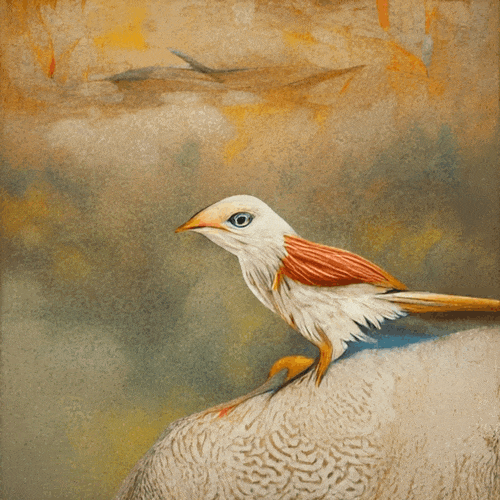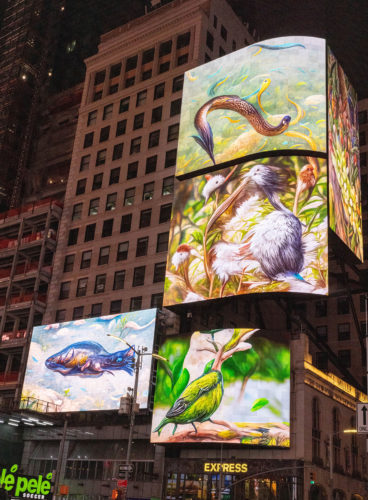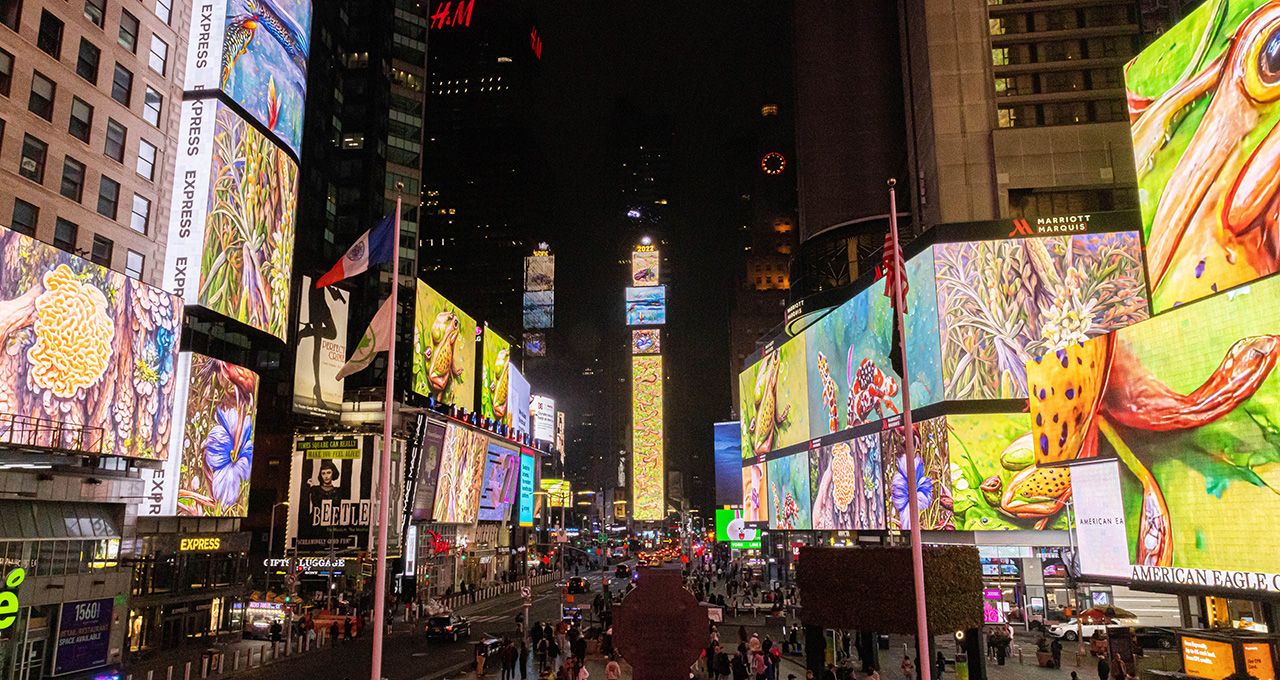Bengal tigers, red pandas and mountain gorillas are among the world’s most familiar endangered species, but tens of thousands of others — like the Karpathos frog, the Perote deer mouse or the Mekong giant catfish — are largely unknown.
Typically perceived as lacking star quality, these species are now roaming massive billboards in one of the world’s busiest destinations. An AI-powered initiative is spotlighting lesser-known endangered creatures on Times Square billboards this month, nightly in the few minutes before midnight across nearly 100 screens.
The project, dubbed Critically Extant, uses AI to illustrate the limited public data available on critically endangered flora and fauna. It’s the first deep learning art display in the Times Square Arts program’s decade-long history.
“A neural network can only create images based on what it’s seen in training data, and there’s very little information online about some of these critically endangered species,” said artist Sofia Crespo, who created the work with support from Meta Open Arts, using NVIDIA GPUs for AI training and inference. “This project is ultimately about representation — for us to recognize that we are biased towards some species versus others.”

These biases in representation have implications on the effort and funding given to save different species. Research has shown that a small subset of endangered species that are considered charismatic, cute or marketable receive more funding than they need, while most others receive little to no support.
When endangered species of any size — such as insects, fungi or plants — are left without conservation resources, they’re more vulnerable to extinction, contributing to a severe loss of biodiversity that makes ecosystems and food webs less resilient.
Intentionally Imperfect Portraits
The AI model, created by Crespo and collaborator Feileacan McCormick, was trained on a paired dataset of nearly 3 million nature images and text describing around 10,000 species. But this still wasn’t enough data to create true-to-life portraits of the less popular endangered species.
So the deep learning model, a generative adversarial network, does the best it can, guessing the features of a given endangered species based on related species. Due to the limited source data, many of the AI-generated creatures have a different color or body shape than their real-life counterparts — and that’s the point.
“Part of the project was relying on the open-source data that’s available right now,” said Crespo. “If that’s all the data we have, and species go extinct, what kind of knowledge and imagination do we have about the world that was lost?”
Critically Extant features more than 30 species, including amphibians, birds, fish, flowering plants, fungi and insects. After feeding species names to the generative AI model, Crespo animated and processed the synthetic images further to create the final moving portraits.
The AI model behind this project was trained using a cluster of NVIDIA Tensor Core GPUs. Crespo used a desktop NVIDIA RTX A6000 GPU for what she called “lightning-quick” inference.
AI in the Public Square
Critically Extant’s Times Square display premiered on May 1 and will be shown nightly through the end of the month.

The three-minute display features all 30+ specimens in a randomized arrangement that shifts every 30 seconds or so. Crespo said that using the NVIDIA RTX A6000 GPU was essential to generate the high-resolution images needed to span dozens of digital billboards.
Crespo and McCormick, who run an ecology and AI-focused studio, also enhanced the art display with an AI-generated soundtrack trained on a diverse range of animal sounds.
“The idea is to show diversity with many creatures, and overwhelm the audience with creatures that look very different from one another,” Crespo said.
The project began as an exhibition on Instagram, with the goal of adding representation of critically endangered species to social media conversations. At Times Square, the work will reach an audience of hundreds of thousands more.
“Crespo’s work brings the natural world directly into the center of the very urban environment at odds with these at-risk species, and nods to the human changes that will be required to save them,” reads the Times Square Arts post.
Crespo and McCormick have showcased their work at NVIDIA GTC, most recently an AI-generated fragment of coral reef titled Beneath the Neural Waves.
Learn more about AI artwork by Crespo and McCormick on the NVIDIA AI Art Gallery, and catch Critically Extant in Times Square through May 31.
Times Square images courtesy of Times Square Arts, photographed by Michael Hull. Artwork by Sofia Crespo.
